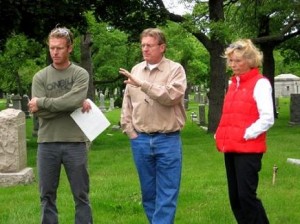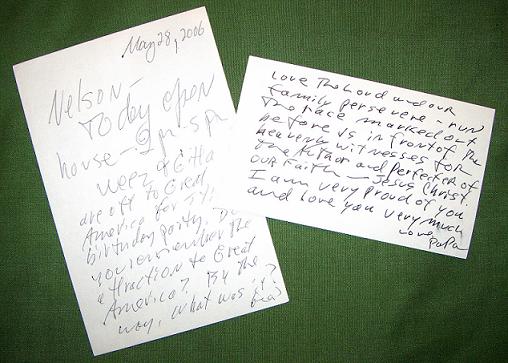I’ve helped plan three funerals… so far… and at each one I’ve been surprised at how fast that day unfolds. Once the service begins, there is no time to talk to friends or even family. As the service ends, guests file past the casket, are ushered outdoors and are gone. Family members gather briefly for a last look, the casket is closed, and everyone fans out to the cars.
Once at the cemetery, protocol separates family members from others. At Nate’s graveside, we were able to focus briefly on the pastor’s words, but then the casket was quickly lowered from view and the event was over. There wasn’t time to think, much less process what had just occurred. On that day, November 7th, as I sat in the center chair facing Nate’s casket, I knew I’d want to return to the cemetery soon, to collect my thoughts.
Today was the day.
After driving Hans, Katy and baby Nicholas from Michigan to O’Hare Airport in Chicago to begin their journey back to England, I drove across the city to Rose Hill Cemetery. Despite the curvy lanes between grave yard sections, finding Nate’s burial site was easy. Our family has come to this spot every Memorial Day for decades, sharing memories about the six people already buried in the family plot: my mom and dad, my grandfather and grandmother, my great uncle, and dad’s baby brother. After the cemetery visit, we always share a picnic and a baseball game.

Although most people shy away from trips to the cemetery, our family counts them among our most important traditions. Since toddlerhood, our kids have been taught that death is part of life and is not to be feared. I have a picture of Dad standing with his hand on the grave marker as he told us, “My father told me, as we buried my mother, that one day we would also bury him there. And we did. I can say the same about me. One day you’ll bury me here, too.” A few years later, we did.
Mom used to say, as she helped our pre-schoolers plant flowers around the big headstone, “Every day, we’re all one step closer to the grave, and I can’t wait, because that’ll mean I’ll be with Jesus.”
The day we buried Mom, her 15 grandkids cried hard, but they’d been prepped for that moment by Grandma herself. They were told ahead of time about her departure and all knew she had happily taken up residence in heaven. They’d heard it from her own mouth.
But what about Nate? Today, as I stood at the foot of his grave in a chilly wind, I couldn’t help having another moment of this-can’t-possibly-be-real. At my feet was a section of fresh sod four feet wide and nine feet long. Three urns of funeral flowers were lying on their sides next to the sod. Was it possible my husband was buried beneath my feet, lying there in his new grey suit? Hadn’t I just told him how good he looked in it, the first time he wore it to work? Hadn’t he been to court wearing it the day we learned of his cancer? How could he now be dead and buried in it?
I thought back to Memorial Day of this year when our family gathered again at that exact spot, 24 of us. In one of the pictures taken that day, Nate is sharing a memory while standing exactly over the spot where his body would soon be buried. Although none of us were thinking about the possibility of a 2009 death for him or anybody else as we stood at the cemetery that day, God had specific funeral plans for my husband, five months later. We can’t explain the Lord’s timing, and Nate’s burial was an agonizing family milestone, but to a certain extent, we’d been prepared. As we drove in behind the hearse that carried his casket, it was not creepy or scary. All of us were arriving at a familiar place of warm family memories. Besides, we knew the whole truth.
Cemeteries are all about death, and death is appalling. But one of the reasons we got through Nate’s burial fairly well was because of the years of stories about our relatives whose bodies are beneath the cemetery grass on which we’ve stood each Memorial Day. As we’ve remembered them each year, we’ve been sure their souls were not dead but were experiencing “joy unspeakable” (1 Peter 1:8) in heaven. Our rich Christian heritage has covered the horror of death with the scriptural promise of eternal life.
Today, as I shivered from the cold and the emotion of the moment, I got back into the car and started the engine to get some heat. A CD came to life playing my favorite hymn, “To God Be the Glory”:
“Great things He has taught us. Great things He has done,
And great our rejoicing through Jesus the Son,
But purer and higher and greater will be
Our wonder, our transport, when Jesus we see.”
The whole truth of Nate’s presence in the cemetery is that he isn’t really under that sod. His body-shell is there, inside his grey suit. But the real him has taken up residence elsewhere. The ugly reality of death has been gobbled up by victory through Jesus and his all-inclusive death on the cross.
“Just as there are natural bodies, there are also spiritual bodies. When our dying bodies have been transformed into bodies that will never die, this Scripture will be fulfilled: ‘Death is swallowed up in victory. O death, where is your victory? O death, where is your sting?’ But thank God! He gives us victory over sin and death through our Lord Jesus Christ.” (1 Corinthians 15:44, 54-55, 57)

